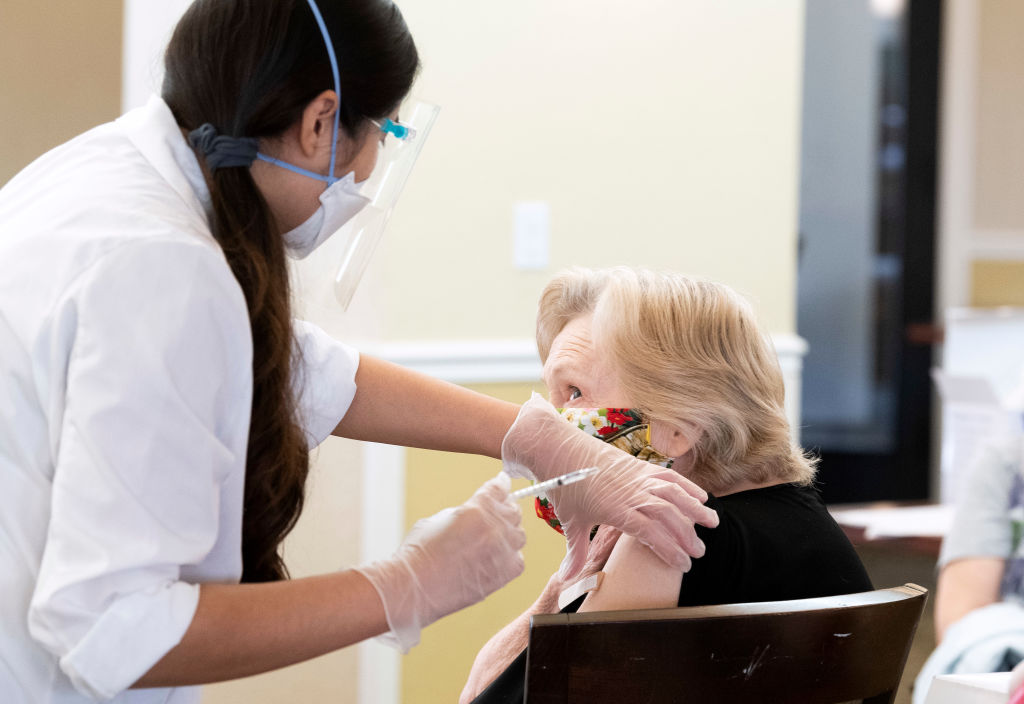HARRISONVILLE, Mo. — We are learning of the first metro healthcare worker to suffer a severe allergic reaction to the COVID-19 vaccine.
The Cass County healthcare worker got the Moderna shot in late December, blacked out and ended up on a ventilator. What happened to her is a cautionary tale, with important information everyone should know.
Chavonya Littlejohn has had a front row seat to the pandemic. She’s a patient access team leader at Belton Regional Medical Center. Right after Christmas, she decided to take her shot at getting the Moderna COVID-19 vaccine.
Some metro residents concerned about fair distribution of COVID-19 vaccine
“I was thinking better to protect my family, I should probably try to get this,” Littlejohn said.
But like many, she was nervous. In 2019, Littlejohn had a severe allergic reaction to MRI contrast dye. That, coupled with what she read in a vaccine brochure, pushed her to wait a few days before getting vaccinated.
“My family has questions, and I have questions. I wanted to do some research,” she said.
While she couldn’t find all the answers, she felt good enough to get her shot on Dec. 29. But within minutes, her chest felt hot, and she was itchy all over.
Metro health care workers get second dose of COVID-19 vaccine
“I looked at my arm, and I was like, ‘Oh my goodness.’ It’s red. So I kind of flagged one of the nurses down,” Littlejohn said.
Littlejohn remembers walking to the ER, then seeing a swarm of doctors and nurses. She got a few EpiPen injections, then IVs.
“It was getting worse and worse. My face swelled up. My lips swelled up,” she said.
Everything went black.
She woke up more than 30 hours later hooked to a ventilator in unfamiliar surroundings. Littlejohn had been taken to Research Medical Center, where she remained for three days.
“They definitely consider it an anaphylactic reaction. Anaphylactic shock is what it was,” Littlejohn said.
Symptoms you may experience after getting a COVID-19 vaccine
Littlejohn’s working with a major national firm, specializing in vaccine injury cases.
Right now, the COVID-19 vaccine under its emergency use is not eligible for
standard vaccine injury relief through the courts.
Instead, your only option if you get sick or even die from the vaccine is to file under what’s called “
countermeasures.” It also reduces the time you have to make a claim, from three years with other vaccines, to one year.
“You’re not going to have an attorney representing you. You’re just going to fill out a form. They’re going to look at your medical records, not a judge, just some administrator, and if they don’t think your injury was caused by the vaccine, that’s the end. There’s no appeal or any way to bring expert witnesses, which is what we’d do in regular vaccine court,” said Anne Toale, an attorney with Maglio, Christopher and Toale.
Toale and others who specialize in vaccine injury are now fighting to change that. But it’s not a simple process. It will require layers of federal changes.
Should I get a COVID-19 vaccine if I’ve had the virus?
In the meantime, Littlejohn’s preparing to go back to work. Even after all she’s been through, she still wants others to consider getting the COVID-19 vaccine.
“Be hesitant, and do your due diligence. But I do think the vaccine is probably a good thing because it’ll help us just like the masks. It’ll help us get back to a more normal life,” Littlejohn said.
Littlejohn has filed a report through what’s called
VAERS, the federal Vaccine Adverse Event Reporting System. Anyone with severe reactions should do the same.
What happened to her is rare. For reference, the University of Kansas Health System and Wyandotte County Unified Government Health Departments have given combined 10,000 shots so far, with no severe reactions.
“We’re just not seeing it. That’s the truth. Vaccines — Pfizer, Moderna — safe. COVID — not safe,” said Dr. Steven Stites, University of Kansas Health System pulmonology and critical care specialist.
Per the
CDC, anyone who experiences a severe allergic reaction is not eligible to take the second dose of either the Moderna or Pfizer COVID-19 vaccine. So Littlejohn will not receive another vaccination.
Kansas City area doctors urge Black residents to get vaccine
HCA Midwest Health spokeswoman Christine Hamele told FOX4:
“Mirroring national data as reported by the Centers for Disease Control, adverse reactions to the COVID-19 vaccines have been rare. Due to HIPAA privacy laws, we cannot comment specifically on this situation, but below is our statement:
‘Throughout the COVID pandemic, our top priority has been the safety of our colleagues and patients. Our vaccine clinics follow CDC-recommended safeguards to help ensure the safety of our colleagues, including onsite monitoring after their vaccinations, onsite medications and equipment (such as epinephrine and antihistamines) and 24/7 access to ER care.
‘While colleagues are not be required to be vaccinated, our infectious disease experts as well as those at the CDC are strongly encouraging vaccination as a critical step to protect individuals from the virus. In line with CDC guidance, we also urge anyone with a past history of allergic/anaphylactic reactions to consult with their primary care physician before deciding to receive the vaccine. Anyone with an adverse reaction to any mRNA COVID 19 vaccine or any of its components should not receive the vaccine at this time.'”
Moderna did not return FOX4’s request for comment about this case. However, its website cautions anyone with a history of severe allergic reactions should consult their healthcare provider before getting the vaccine and that anyone with a history of allergic reactions to Polyethylene Glycol, should not get this COVID-19 vaccine.
Medicines with PEG include laxatives, acetaminophen (i.e. Tylenol), some allergy medicines and opioids.


 Ministers are even thinking about further restrictions and a next meet up will be held 1 week earlier than planned. Some towns/states are even considering of closing down the public transport, though to the spokesman of the chancellor it will not be happening. Rant on: I think the next step could be, that everybody should lock oneself up in ones own room, dig a hole and walk with masks around at home and of course, dig a howl only with your mask on and disinfect your tools properly. Rant end. It's like a never ending story and as stated in this topic already that psychopaths will use it till the end.
Ministers are even thinking about further restrictions and a next meet up will be held 1 week earlier than planned. Some towns/states are even considering of closing down the public transport, though to the spokesman of the chancellor it will not be happening. Rant on: I think the next step could be, that everybody should lock oneself up in ones own room, dig a hole and walk with masks around at home and of course, dig a howl only with your mask on and disinfect your tools properly. Rant end. It's like a never ending story and as stated in this topic already that psychopaths will use it till the end.







